

Singularityhub. Designing learning for a 21st century workforce. "Everything we teach should be different... - Video - World Economic Forum. Il faut se parler de ces nouvelles compétences — FutursTalents. Tech Trends That Will Change Learning in 2018. According to some estimates, enterprises spend more than $3 trillion in IT, and by 2020, enterprises will spend over $216 billion per year in cloud services.
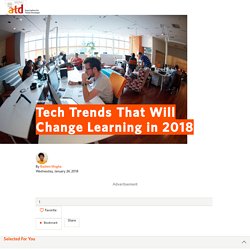
Per a study conducted by LinkedIn, cloud and distributed computing skills are the most sought after skills globally. As enterprises move their workloads to cloud, training and enablement will play a vital role in bridging the skill gap, driving adoption and successful deployments. Democratization of Content We will see more professionals outside of the training team contribute to the creation of learning content. The concept of crowd sourcing will evolve in a big way with solution architects, professional services, and support organizations creating more content. P21 framework 0816. Les écoles finlandaises ne veulent plus de «matières» mais des «thèmes» Obtenir les bonnes compétences: France. Regards sur l'éducation 2017 - Les indicateurs de l'OCDE - fr.
Future of work. The Future of Work Globalisation, technological progress and demographic change are having a profound impact on OECD labour markets, affecting both the quantity and quality of jobs that are available, as well as how and by whom they are carried out.
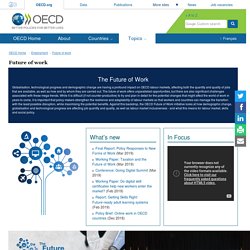
The future of work offers unparalleled opportunities, but there are also significant challenges associated with these mega-trends. While it is difficult (if not counter-productive) to try and plan in detail for the potential changes that might affect the world of work in years to come, it is important that policy makers strengthen the resilience and adaptability of labour markets so that workers and countries can manage the transition with the least possible disruption, while maximising the potential benefits.
Les compétences du 21ème siècle. Depuis quelques années, les compétences nécessaires à la réussite ne sont radicalement plus les mêmes qu’autrefois.
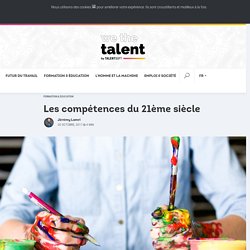
Alors que le sujet est réservé aux hyper-spécialistes en Europe, des milliers d’écoles dans le monde entier ont déjà adapté leur modèle pour enseigner ces nouvelles compétences. Nouveaux savoirs, nouveaux savoir-faire: les compétences du XXIe siècle. Plusieurs organismes internationaux se sont attelés à définir cet ensemble de savoirs et de savoir-faire sur lesquels nos systèmes éducatifs devraient se concentrer pour former les futures générations aux besoins de l’économie de la connaissance.
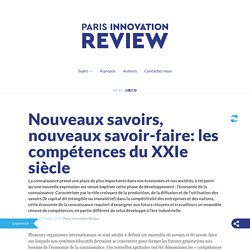
Ces nouvelles aptitudes ont été dénommées les « compétences du XXIe siècle ». Qu’il s’agisse des travaux en la matière de l’OCDE, du groupement d’expert internationaux ATC21S ou encore de l’organisation américaine P21, on retrouve plusieurs points communs permettant de dégager trois blocs principaux : des compétences génériques d’apprentissage, des compétences d’innovation et de création et des compétences de collaboration. Face à la révolution de l’information Le premier ensemble répond à la nécessité de savoir manoeuvrer dans un monde bouleversé par la révolution de l’information et de la communication. Pédagogie par projets: une approche pédagogique moderne? Comment ne plus être simplement un lieu de transmission passive de savoirs?
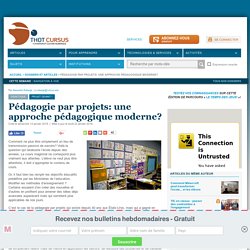
Voilà la question qui tarabuste l’école depuis des années. Le cours magistral ne correspond plus vraiment aux attentes. Project-based learning. Project-based learning (PBL) is a student-centered pedagogy that involves a dynamic classroom approach in which it is believed that students acquire a deeper knowledge through active exploration of real-world challenges and problems.[1] Students learn about a subject by working for an extended period of time to investigate and respond to a complex question, challenge, or problem.[2] It is a style of active learning and inquiry-based learning.
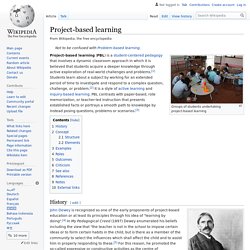
PBL contrasts with paper-based, rote memorization, or teacher-led instruction that presents established facts or portrays a smooth path to knowledge by instead posing questions, problems or scenarios. Thomas Markham (2011) describes project-based learning (PBL) thus: "PBL integrates knowing and doing. Students learn knowledge and elements of the core curriculum, but also apply what they know to solve authentic problems and produce results that matter. PBL students take advantage of digital tools to produce high quality, collaborative products. 2017 rapport taddei 740190. Preparing Students for Tomorrow's Jobs: 10 Experts Offer Advice to Educators. 40554299. e6caf333ffec9284c926f1aa55eb1d555425. 21st Century Skills: Learning for Life in Our Times - Bernie Trilling, Charles Fadel. Preparing Your Students for the Challenges of Tomorrow. Right now, you have students.
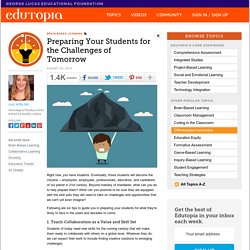
Eventually, those students will become the citizens -- employers, employees, professionals, educators, and caretakers of our planet in 21st century. Beyond mastery of standards, what can you do to help prepare them? What can you promote to be sure they are equipped with the skill sets they will need to take on challenges and opportunities that we can't yet even imagine? Following are six tips to guide you in preparing your students for what they're likely to face in the years and decades to come. 1. Students of today need new skills for the coming century that will make them ready to collaborate with others on a global level. 2.
New information is being discovered and disseminated at a phenomenal rate. 3. In order for collaboration to happen within a global community, job applicants of the future will be evaluated by their ability for communication with, openness to, and tolerance for unfamiliar cultures and ideas. 4. 5. 6. What are the 21st-century skills every student needs? The gap between the skills people learn and the skills people need is becoming more obvious, as traditional learning falls short of equipping students with the knowledge they need to thrive, according to the World Economic Forum report New Vision for Education: Fostering Social and Emotional Learning Through Technology.
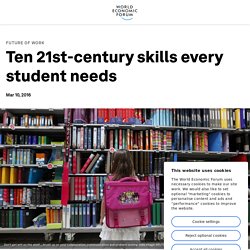
Today's job candidates must be able to collaborate, communicate and solve problems – skills developed mainly through social and emotional learning (SEL). Combined with traditional skills, this social and emotional proficiency will equip students to succeed in the evolving digital economy. What skills will be needed most? An analysis of 213 studies showed that students who received SEL instruction had achievement scores that averaged 11 percentile points higher than those who did not. Repenser-formation-et-compétences-efficacement-pour-avenir. Où est ce grand renouveau de la formation que le marché avait promis il y a quelques années ?
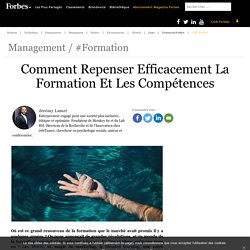
On nous annonçait de grandes révolutions, et un monde de la formation repensé et transformé à jamais. En lieu et place, qu’avons nous eu ? Les MOOC, et, magie du marketing, le blended learning, une autre manière d’expliquer qu’on ne dématérialise tout. Comment évolue l'ingénierie pédagogique ces dernières années. 8 Keys to Designing Tomorrow’s Schools, Today. For the past 20 years, we have worked as teachers, administrators and advisors in public schools around the country.
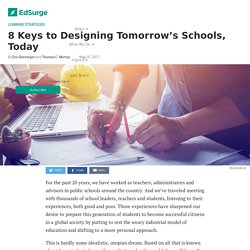
And we’ve traveled meeting with thousands of school leaders, teachers and students, listening to their experiences, both good and poor. Those experiences have sharpened our desire to prepare this generation of students to become successful citizens in a global society by putting to rest the weary industrial model of education and shifting to a more personal approach. This is hardly some idealistic, utopian dream.
The Smart People Designing Tomorrow's Learning Experiences. The Goal of Good Design “It’s really about creating effective learning experiences,” says David Porcaro, Director of Learning Capabilities Design for Pearson. David and his colleagues are baking in learning sciences research into the next generation of education tools for learners—of all ages. “We’re collaborating with other Pearson researchers, designers, developers, and subject matter experts on digital learning experiences,” he says, “and when we’re able to achieve a good design it means learners see better outcomes.”
Agile, Integrated Teams.